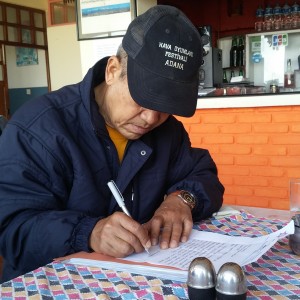
Yesterday Prof. Edwin van Teijlingen met with Nepalese collaborators from Tribhuvan University to discuss the first training session planned for THET project ‘Mental Health Training for Maternity Care Providers in Nepal‘. The target population of the project comprises community-based health-care practitioners at the level of nurse and below (there are no doctors in rural villages). The project is a collaboration between the Department of Health, Physical and Population Education at Nepal’s oldest and largest university, Tribhuvan University’s (TU), and two UK universities, Bournemouth University (BU) and Liverpool John Moores University (LJMU), and supported by our local partner, Green Tara Nepal (GTN). BU has a long history of working with GTN as well as its sister organisation Green Tara Trust (GTT), a Buddhist charity based in London. The project is funded from a grant awarded under the Health Partnership Scheme (HPS). HPS put money into health partnerships to carry out training and capacity-building projects in low-income countries, such as Nepal. HPS itself is funded by the UK Department for International Development (DfID) and managed by THET (Tropical Health & Education Trust).
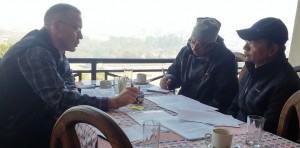 Prof. Edwin van Teijlingen is one of the first volunteers together with BU Visiting Faculty Dr. Bibha Simkhada (research nurse at LJMU & practising nurse in the NHS). Together with collaborators in Nepel they will deliver the first training early in 2016 (i.e. next week) on this THET project. The first photo shows Prof. Lokendra Sherchan writing a letter of invitation to the District Public Health Officer in Nawalparasi inviting him to encourage his staff to participate in our training. The letter is beautifully handwritten in Nepali as the university is closed between terms at the moment. The second photo shows professors Shyam K Maharjan, Ram K Maharjan and Edwin van Teijlingen in discussion with Kathmandu in the background. Both photos are taken by GTN’s Samridhi Pradhan. We have published some of the background information on our project earlier this year in the Nepal Journal of Epidemiology [1].
Prof. Edwin van Teijlingen is one of the first volunteers together with BU Visiting Faculty Dr. Bibha Simkhada (research nurse at LJMU & practising nurse in the NHS). Together with collaborators in Nepel they will deliver the first training early in 2016 (i.e. next week) on this THET project. The first photo shows Prof. Lokendra Sherchan writing a letter of invitation to the District Public Health Officer in Nawalparasi inviting him to encourage his staff to participate in our training. The letter is beautifully handwritten in Nepali as the university is closed between terms at the moment. The second photo shows professors Shyam K Maharjan, Ram K Maharjan and Edwin van Teijlingen in discussion with Kathmandu in the background. Both photos are taken by GTN’s Samridhi Pradhan. We have published some of the background information on our project earlier this year in the Nepal Journal of Epidemiology [1].

References:
- van Teijlingen, E., Simkhada, P., Devkota, B., Fanning, P., Ireland, J., Simkhada, B., Sherchan, L., Silwal, R.C., Pradhan, S., Maharjan, S.K., Maharjan, R.K. (2015) Mental health issues in pregnant women in Nepal. Nepal Journal of Epidemiology 5(3): 499-501. http://www.nepjol.info/index.php/NJE/article/view/13607/11007



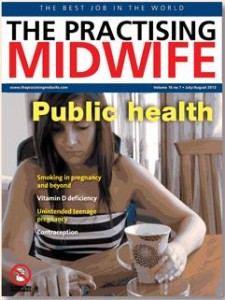 Carol Richardson, joint Portsmouth Hospitals NHS Trust and CMMPH’s PhD student, published her latest article ‘On running for supervisor’ in the most recent edition of The Practising Midwife. Carol as Clinical Academic Doctoral Midwife is conducting her thesis research on the topic of pregnancy and obesity. Her PhD is supervised by FHSS Prof. Vanora Hundley, Dr. Carol Wilkins & Prof. Edwin van Teijlingen.
Carol Richardson, joint Portsmouth Hospitals NHS Trust and CMMPH’s PhD student, published her latest article ‘On running for supervisor’ in the most recent edition of The Practising Midwife. Carol as Clinical Academic Doctoral Midwife is conducting her thesis research on the topic of pregnancy and obesity. Her PhD is supervised by FHSS Prof. Vanora Hundley, Dr. Carol Wilkins & Prof. Edwin van Teijlingen.







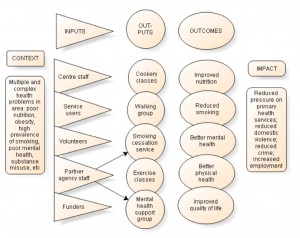




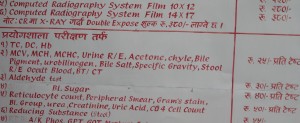
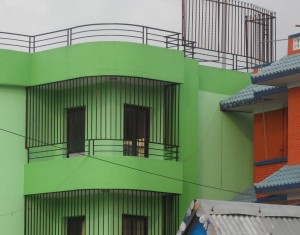
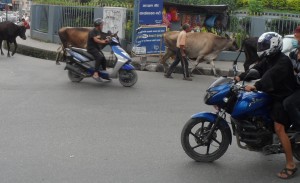 Today I attended a contract-signing meeting at the Department of Health, Physical and Population Education at Nepal’s oldest university, Tribhuvan University (TU).
Today I attended a contract-signing meeting at the Department of Health, Physical and Population Education at Nepal’s oldest university, Tribhuvan University (TU). Midwives (ANMs) about the key mental health issues in pregnancy and in the months after birth. A local charity Green Tara Nepal (GTN) will support the work through some of the curriculum design, sensitising UK volunteers to live in rural Nepal, assisting in translating, as well as helping to recruit the local health workers. The two UK universities have a long history of working with GTN as well as its sister organisation Green Tara Trust (GTT), a Buddhist charity based in London. The new project will be based in Nawalparasi in the sub-tropical part of the country bordering India. The target population consists of grassroot health care practitioners since there are no doctors in these rural villages.
Midwives (ANMs) about the key mental health issues in pregnancy and in the months after birth. A local charity Green Tara Nepal (GTN) will support the work through some of the curriculum design, sensitising UK volunteers to live in rural Nepal, assisting in translating, as well as helping to recruit the local health workers. The two UK universities have a long history of working with GTN as well as its sister organisation Green Tara Trust (GTT), a Buddhist charity based in London. The new project will be based in Nawalparasi in the sub-tropical part of the country bordering India. The target population consists of grassroot health care practitioners since there are no doctors in these rural villages.











 REF Code of Practice consultation is open!
REF Code of Practice consultation is open! BU Leads AI-Driven Work Package in EU Horizon SUSHEAS Project
BU Leads AI-Driven Work Package in EU Horizon SUSHEAS Project Evidence Synthesis Centre open at Kathmandu University
Evidence Synthesis Centre open at Kathmandu University Expand Your Impact: Collaboration and Networking Workshops for Researchers
Expand Your Impact: Collaboration and Networking Workshops for Researchers ECR Funding Open Call: Research Culture & Community Grant – Apply now
ECR Funding Open Call: Research Culture & Community Grant – Apply now ECR Funding Open Call: Research Culture & Community Grant – Application Deadline Friday 12 December
ECR Funding Open Call: Research Culture & Community Grant – Application Deadline Friday 12 December MSCA Postdoctoral Fellowships 2025 Call
MSCA Postdoctoral Fellowships 2025 Call ERC Advanced Grant 2025 Webinar
ERC Advanced Grant 2025 Webinar Update on UKRO services
Update on UKRO services European research project exploring use of ‘virtual twins’ to better manage metabolic associated fatty liver disease
European research project exploring use of ‘virtual twins’ to better manage metabolic associated fatty liver disease